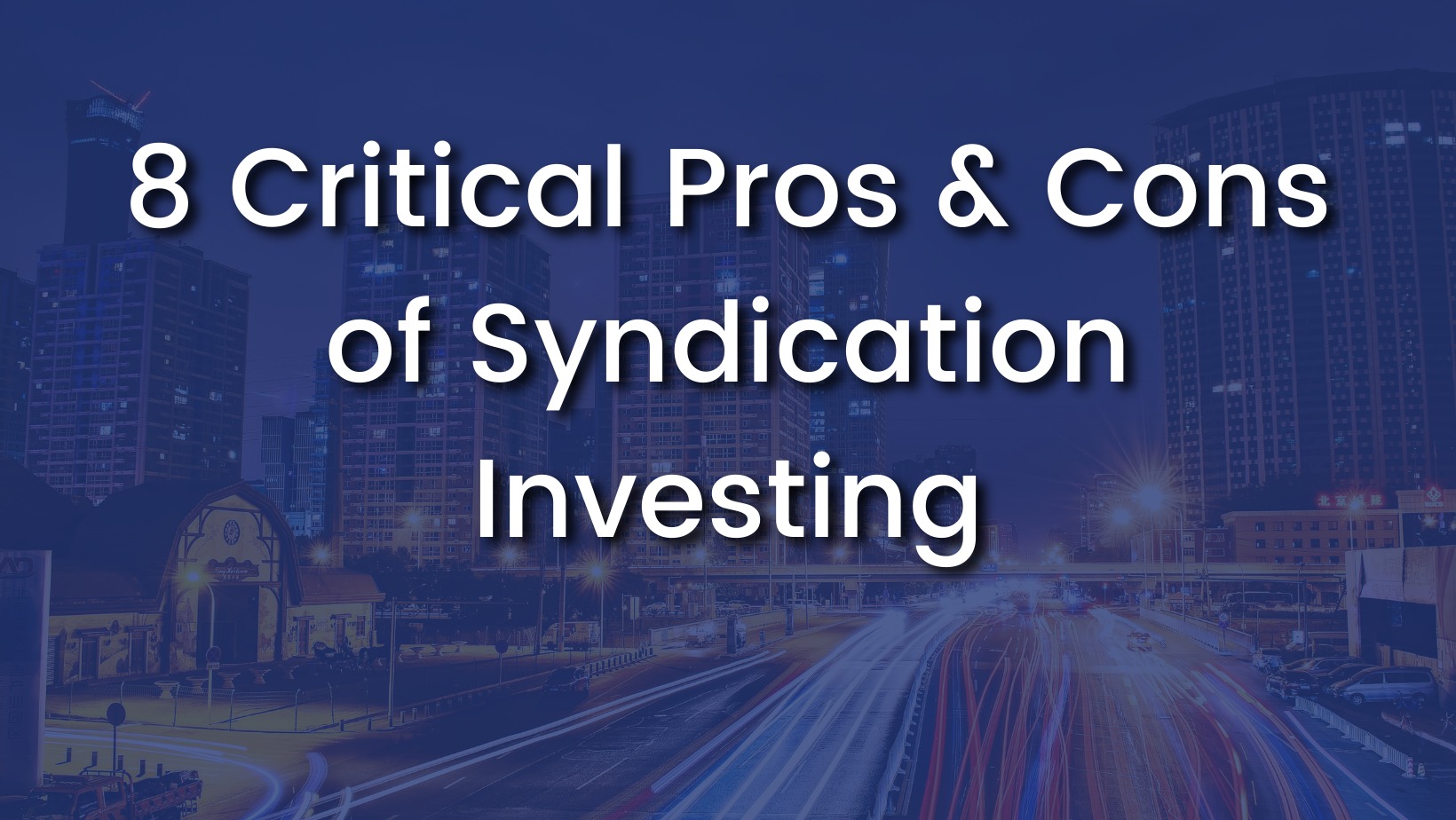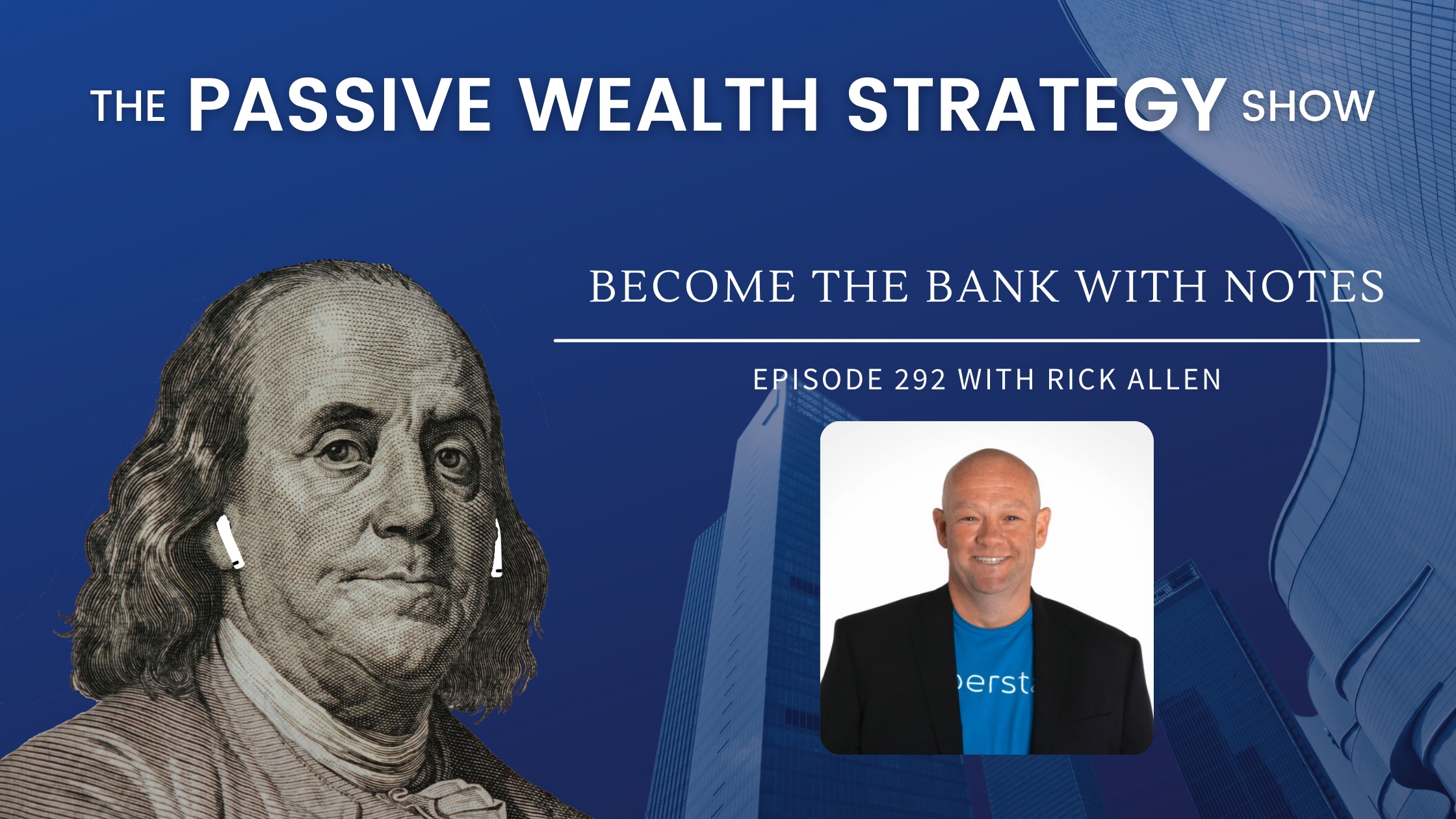
Become the Bank with Notes with Rick Allen
Rick. Thank you for joining us today.
Thanks, man. I appreciate you having me, Taylor.
Hey, it’s been great talking with you so far for about 40 minutes and I’m sure we’re going to have a great time for our listeners here for those out there who don’t know about you and your business. Can you tell us about your background and paper stack and then we’ll get on.
Sure. First and foremost, I’m a husband and a father of three beautiful kids, and my beautiful wife who supports me in everything I’ve done. Wouldn’t be here without her. I’m based in Orlando, Florida, and I’ve been investing in real estate. 2005. That’s when I got my real estate license actually got it in 2004, started with timeshare, but had been doing distressed assets in real estate.
Since then I made a pivot to buying notes and 2012. March 2012 and went into that full-time and now I currently run I’m a founder co-founder and CEO of the paper stack which is an online trading platform for people to buy and sell mortgages. It’s been a wild ride, man.
It’s been a real wild ride.
That’s great. And I wanted to talk with you today about note investing as an alternative to, all the say dividends, stocks, or anything out there on wall street. I believe that notes, mortgage note investing is really one of the top options for busy professionals to invest in real estate or real estate type assets.
Let’s break into that compare and contrast some of those things or some of the advantages of notes versus stock investment.
Sure. I love investing in notes in real estate in general, but no specifics, because it’s backed by real estate. So there’s an actual, tangible asset there.
It’s insured. I can have title insurance on it. I can have hazard insurance on it. So if it burns down, at least my money is secure to a certain degree. I love it because it’s, it can be steady cash flow. And there are multiple exit strategies. There are multiple things I can do with owning the debt.
You can get leverage on portfolios, really, no matter what portfolio it is, you can get leverage on them. But notes offer a unique way to invest in real estate without having to worry about toilets and sinks and being a landlord. You can get in there and you can own something, collect the cash flow and liquidate when you need to.
There’s a lot of benefits to it. There’s less volatility. I think. In the debt space and maybe the real estate market or the stock market, we’ve seen some of the wild things in the stock market where it’s for one reason or another, somebody can just pull the ripcord and something just drops.
The stock market in general can drop. We saw it happen, last what last February, March, when COVID hit things just drop. And usually. Usually, it’s just more, the stock market seems to be more volatile.
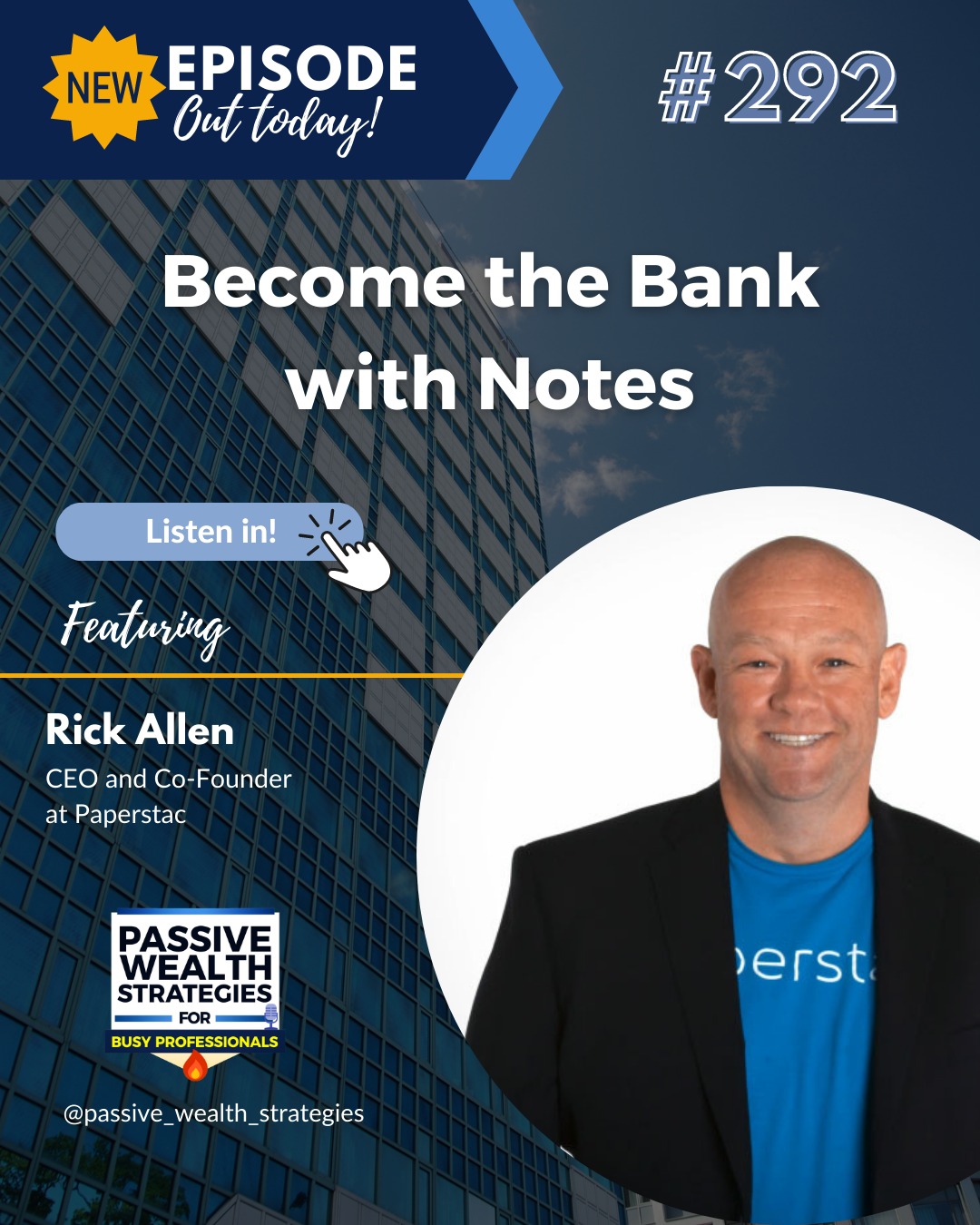
Become the Bank with Notes with Rick Allen
Yeah. And I think most folks aren’t aware of notes, even as an option for real estate investing.
You’re telling me before we hit record. When you were getting started as a note investor and realizing that, how few people really knew about it back then. And I think it’s obviously grown, but that’s still the case today, for the most part, most people aren’t aware of note investing as, an alternative to saying buying a rental property down the street.
No, definitely not. It’s still something that’s growing. There were a few people who were buying and selling. There are, quite a few people buying and selling sonar or a seller finance notes, seller carryback owner, finance loans in the seventies, eighties, nineties, but really when this last downturn happened and when the market crashed in oh eight, it was Obama made.
He made a directive if you will. That said, look, I’m not going to be the administration that forecloses on America. You need to start offloading your debt to the banks. And so they did, the banks started offloading them in large chunks and, selling them to black, Blackstone, black BlackRock, stuff like that.
Those large hedge funds who were taking the, really the cream of the crop off the top assets were 300,000 or more. And then they’re breaking up the rest of the pools and they’re selling them off to small, to mid-tier funds. And you ran into a situation, I think, where you had. These mid-tier funds maybe had two, 300, $400 million, which is overcapitalized, but they had not as much manpower.
So you buy, 3000 assets and she got to, you have to either work them or work on a velocity model and sell them quickly. And they just, you started seeing mortgage notes, hit the retail market space, a marketplace where people could. By a note. I didn’t even know you could buy notes. I’ve heard of it.
But I had an REO agent to call me up who had purchased, a dozen houses through and said, Hey, do you buy mortgage notes? And I was like, yeah, I’ll take a look at it. And so that’s where we started our venture, but yet not a lot of people know about notes and it’s getting the space is getting bigger, but still not what it, it probably could.
Yeah, it’s still for sure. A niche in the real estate investing space. You mentioned a little bit earlier about multiple exit strategies. And could you tell us about those? Because it seems like the most logical one is just to wait for the borrower to pay off the loan, but that might not be. The fastest way to make a return or to make the biggest return or the right fit for somebody out there.
So let’s cover those exit strategies that are out there.
One of the things about buying notes is it’s really no different than real estate. You make your money really on the buy when you buy it. So if you buy it you buy low, sell high that’s everything, isn’t it that’s investing.
You don’t want to buy high, sell low. But you make your money on the buy. So if you get into a loan at the right price and that could be for multiple reasons, whether you bought one non-performing and you turned it performing. So if somebody is not paying it’s non-performing and obviously a non-performing loan, they sell for less than a performing loan.
So if you were to buy something, non-performing for say 60 cents on the dollar, help out the borrower getting paying again, you can turn around and resell that after it’s been seasoned for six or 12 months, For anywhere from 87 to 90 cents on the dollar is what I’m seeing on our platform. And the whole time you’re making a monthly payment off of them.
So you can that’s one exit strategy. Another exit strategy is simply just to buy low and did Retraded immediately for a couple of thousand bucks and just focus on a velocity model. Maybe you’re working more of a wholesaler type of Business model to where you’re finding stuff and then going out and reselling it to other investors.
You don’t know where to find products. That’s definitely one avenue. And then there’s some fancy stuff called hypothecation or selling a partial to where you buy alone. Maybe you bought a performing loan at a really great price and you turn around and you sell just the. 60 payments for a lump sum of money.
And then after 60 payments, you start collecting the payments again. So there are tons of different ways you can Liquidate the performing side on the non-performing side, you may have to take a house back through foreclosure. So before you get to foreclosure, you have the option of doing, a deed in lieu and getting the house back directly with no legal fees.
You can offer them a short sale, which is something else you could offer them a short payoff to say, look, we’ll take you to owe a hundred, give me 80. And I’ll just sign the house over. Which surprisingly people have aunts and uncles and moms and dads that they can go to, Hey, I can get my house if you just loan me $80,000.
And it happens. There’s if you end up taking the house back, you can resell the house through traditional means on the real estate market, through the MLS, through a real realtor, or you can sell it yourself. You can hold financing on it, you can keep it and lease it, rent it, lease options.
So there are tons of different exit strategies, really starting from the time you buy it and it’s performing or non-preferred. And then once you get it into real estate if that’s your goal, you’ve got tons of opportunities there and having the knowledge of. The note space allows you then to open up a few more options, like an owner financed play, or a contract for deed, or at least lease to a lease option stuff along those lines.
Getting a little fancy is there now you mentioned you make your money when you buy, which is true in most types of real estate, if not all types of real estate. And speaking of the. I wonder about how you even get started narrowing down what you’re going to invest in. And for example, if I know I’m going to go buy an apartment complex, then I’ll probably start by finding one, two, maybe three markets that have good dynamics, and I’m going to look for deals there.
And. Your paper stack platform is very nice. You have a lot of great filters and ways to screen through deals and a lot of awesome information. And I want to commend you of course, on, on that, especially in light of some of the other notes, investing platforms have come and gone over the years that some of them you’re not paying me to say that some of the other ones sounded fly by night, whereas your seams and I’m sure is legitimate and well-thought-through, and all those great things, but regarding sorting through deciding what you’re going to buy, maybe where you’re going to buy it because there are 50 states out there. How do you even get started in that?
It all, starts with one knowing what are you in this for? Are you in this for the passive wealth? Are you looking for performing loans? Are non-performing loans. That’s what I always tell him. He was like, look, you have to know what’s my goal is my investment goal to get a property back, or is my investment goal to, invest some of my dollars, some of my little soldiers and have them out there just earning me my income or earning, my past my mailbox money is Eddie would say so you have to establish the goal.
Then you want to look at, the market’s thing is a great option. It’s something. I tell people that, look, you want to make sure that you’re investing in areas you’re comfortable with. It always helps to have boots on the ground, but you have to go through and maybe look at there are some other things you need to look at when you’re investing in notes like licensing.
Are there certain states that are going to require me to hold like mortgage debt, collectors license Georgia? If one of them, you need to have a certain license, to own debt in Georgia. If you meet a certain threshold, if you’re investing with a comp within a company, or you’re investing more than four or five notes, and don’t quote me on the laws there, but there’s just, there’s different.
There are different requirements in different states. Some states are just like, you can own, you can invest in mortgage debt. So you want to know the licensing laws, but, and then sourcing inventory. It’s, kinda, that’s one of the nice things about the paper stack. There’s a couple about it, but one is that you can go look at inventory for free, right?
It’s free to sign up. You don’t pay for our fee, our services until you buy a buy an actual node. And then, the second thing is if it’s your first time buying a note, the paper stack has an automated to-do list that allows you to check every step along the way. So you can’t go from step one to step four without doing steps two and steps.
And it makes it to where somebody has never bought alone can do a transaction with somebody who works for a bank and they can get through the transaction without missing a step and be comfortable. And so it makes it very easy for first-time users or the first time.
Nice. That’s definitely very helpful because it’s in any type of investing, you need a roadmap to at least get started till you’ve learned the ropes and all of that regarding the licensing and all of that.
And obviously, yeah we’re not telling people what the laws are or anything like that here, but like, where can you start? Figure that out. Is that, is there a repository online for that information? You have to go to each state and ask? No.
We have some stuff in our knowledge base, we, because of the sensitivity of it.
I, we can’t put out there a spreadsheet one day that says you have to be licensed in this place and not licensed in that place. The easiest thing, because it a, it could change. And then if I tell somebody you don’t need to be licensed, you need to be licensed. They’re there. They’re coming back to me.
So we don’t put a lot of stuff in there. We just recommend folks like, look, go check with an attorney. And that’s the safest thing to do. When we started buying loans, I started buying loans and. Because I live in Florida is actually in Orlando because we lived in Orlando.
We bought it in our own backyard. Cause I came from the real estate space. I wanted to be able to go see it and touch it and turn the doorknobs and, look at my investment. So naturally, I had attorneys here and asked them like, where can we buy? What can we do? I would just say, just go if you’re, if you have an area like Dubai, You got to check with the attorneys.
Google’s a great place to start as well. You wanna check on Google and get some education like there are educators out there. I’ve mentioned, I went to, note school and Eddie speed. Kevin Shortell, who actually taught me a lot. He used to work for note school. He’s got his own Education pro speak productions or something along those lines, real estate without renters.
If you Google real estate without ranches, you’ll find Kevin ShoreTel and there’ll be able to guide you in. They’re much more up-to-date on Hey, you can buy them here. You can’t buy it there.
Okay. That’s definitely good to know. Now in any real estate investing adventure, it’s the passive wealth strategy show, right?
We’re here to make it as past, as passive as possible. Of course, there’s going to be some level of time investment, but one of the main reasons I recommend away from folks just buying a single-family and managing your own property. And all of that is because of the amount of time invested.
You’re gonna spend a lot of time to make, not a lot of money. Whereas with notes, think there are a lot of options to reduce the amount of time you’re spending on your investments. But can you tell us about the average, say time investment once you start looking for notes by one oh. How can you really reduce that time, especially working with your servicer to set a strategy and all of that?
I think that’s the key. As much as you make your money on the buy the devil’s in the details. If you look at something, did due diligence is the most important thing when you buy alone, right? You want to look at the due diligence and that’s the payment history. And the servicing notes really to find out what’s the story behind the loan.
If you do the work upfront and if you’re looking for passive investments, then you’re going to be probably investing in performing loans. Non-performing tend to be a little more labor-intensive and they’re non-performing so it’s counterintuitive to say that’s a patent. That’s definitely not passive.
It can be really good returns. And I’ll talk about my favorite investment later on, but there if you do the due diligence upfront and you’re buying, performing loans, having a professional loan servicer is the way to go because they’re going to handle everything for you.
Literally, you can do nothing and just they’ll send you money on the 10th of every month after they pay them, make their mortgage payment on the first or somewhere along those lines. And you just collect the money. You can be talking half-hour a month or no time a month.
It just depends on what kind of bookkeeping you’re doing. But you can literally have nothing to do on these loans and they just keep getting paid. And then if there is something to do the servicers, usually sending you an email saying, Hey the borrower missed this payment or they paid extra or something along those lines, more of just keeping you informed.
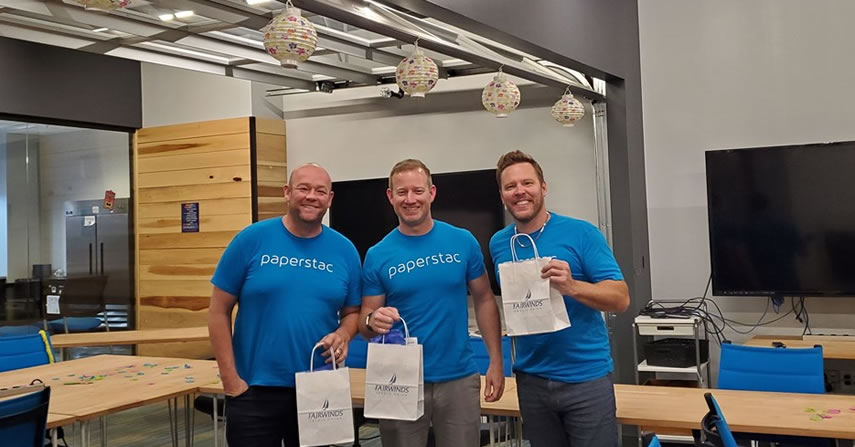
Nice. I do wonder about how significant of a time difference it is between performing and non-performing because theoretically, if someone who’s never done this before, and this note space, okay. Performing the services, doing everything, collecting the money, sending me a report. That’s all it is with.
Non-performing. Setting a strategy and asking the servicer to say, to maybe extend these offers to the borrower or something like that. Are we talking about half an hour, a month per note, on the performing side and. 20 hours a month on a non-performing side, or is it close to that half-hour?
I know this is all relative, right? Every situation’s gonna be different, but really in general, how big of a difference are we talking about? It’s not terribly big difference.
You’re not 20 hours a month on a single non-performing loan. Not a lot. It’s more of the mental bandwidth that it starts taking out.
It’s Hey. I can take one ball and throw it in the air. But when I got seven balls in the air thing, it just it’s a compounding thing. And attorneys like, so servicers are great on performing stuff. Servicers the service, the services you receive, they tend to fall off when they go to non-performing.
And you have to constantly be on your servicers and making sure that they’re chasing after your attorneys or you have to be chasing after your attorney to make sure they’re hitting your deadlines. You get the right attorney, you get the right servicer. It makes all the difference in the world because they’re going to do their job.
And, they tend to, I tend to work with one or two attorneys per state. People that I know to look, I’ve got relationships, I’ve done more than one deal with them. I’ve talked to them on the phone a lot to start with and say, look, this is what I’m looking for. It’s not as much of an issue now, but prior to this, you had foreclosure mills.
And so you were just. And you are a file on to under a, an attorney who had a stack of files. It was 300 deep. If they tried to call you and couldn’t get ahold of you, your file went to the bottom and it may have fallen behind the desk and they don’t see it. It’s just one of those things.
So I think that was a long answer to, is it that much different? No, it’s not. If you’re doing half an hour a month, And it’s not even a half-hour a month. We’re talking maybe 10 minutes on a performing loan, it’s it doesn’t take you long to respond to an email. And if it’s truly performing, it’s nothing but on a non-performing loan, it may take.
Five or six hours of mental bandwidth and emailing and talking on the phone, maybe not even that much. So it’s not significantly different. It’s just understanding that I can manage 40 performing loans far easier than I can, 40 non-performing clubs because at 49 before we load, it’s just, there’s a lot of work.
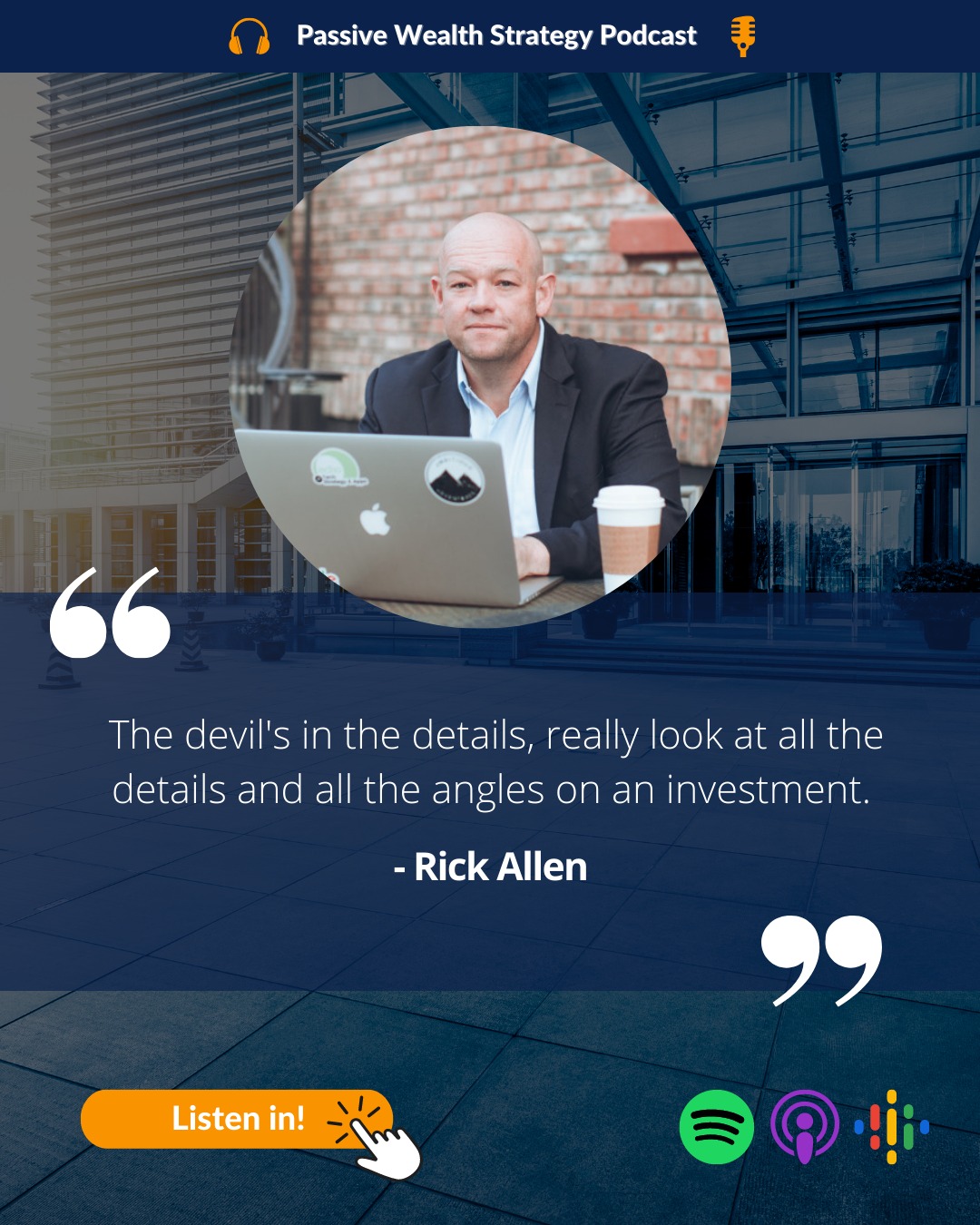
The devil's in the details, really look at all the details and all the angles on an investment.
- Rick Allen Tweet
Fair enough. And so the what exactly? What tasks fall under the heading of the attorney versus the servicing company? I’m sure that’s a huge list, but this, the first time we brought up an attorney in the context of this conversation. So I wanna make sure we define those roles a little bit.
So the attorney is obviously they’re in charge of anything that’s happening with the courts. So they’re in charge of filing the complaint they’re in charge of service or serving the borrower. Really the servicer is in charge of corresponding with borrowers, sending out the letters of notice of default.
The servicer will work with the attorney on that, but staying keeping you in compliance, and then most servicers are supposed to work on your behalf with the attorney. So the servicer would be your mouthpiece. But, if you’re an asset manager and you’ve got, 10 clients in each, client’s got 10 foreclosures, then, things can fall through the cracks and they don’t, they’re not able to keep on top of everything and it’s not their money.
It’s your money. So I find that usually, investors who’ve got their own money are far more, they’re paying attention to what school.
Okay, that makes sense. And you, as the investor need to be the squeaky wheel that gets the grease with the that’s exactly right.
And that’s we actually had something we did call operation squeaky wheel and our office that we did.
And it was it’s how we, what we set up to like workflows to keep pinging our servicer. So it’s Hey, we’re not going away. We are inactive. We’re actively managing disinvestment.
Nice. Is that through like a CRM type of tool or something?
Yeah. Internal stuff. Yeah. Through CRM. Podio is something we use just internal self admin.
Nice. Podio has a ton of customization options. So yeah, there are a lot of ways to adapt that to any business. Yeah. Nice. Right now we’re going to take a quick break first. All right, Rick, I’ve got three questions. I ask every guest on the show. Are you ready? Yes. Great. First one. What is the best investment you ever made other than in your education?
Yeah, I would say my real estate license, but that I would qualify that falls under the education side to get it. The best. I think the best investment, the one I’m really most proud of is actually a deal that we did because it was looking at the details. We bought something at what was perceived as close to the balance owed to us.
And I saw that the through looking through the. The payment history and the servicing note that the bar is actually one of the signs, the house over. And so we paid, I think it was like 35 grand for it and ended up selling it for 90 grand. 60 days later as is after the borrower just signed the house right over to us.
And so that was like, that was probably my biggest home run in the shortest amount of time. Just to do it like that. And that’s just because it was, paying attention to the details that everybody overlooked. It sat on a paper stack for three months and nobody offered on it. Wow. And I was like, what’s going on with this?
I looked at it. I was like, oh, this is like a good deal. And when I looked at it and we, I always say we gave it away at 90 grand, but we could have held out and probably sold it for another, maybe for one 10, but it was just, we had a cash offer. And so we’re like, Nice.
Nice. We had the best investment.
Now we go to the other side of that coin, the worst investment. What is the worst investment you ever made?
The worst investment was one in Louisville, Kentucky, and it was, it’s a huge house. Then, there was already judgment. So it was like, it was supposed to be a slam dunk deal, look, judgments entered.
Judgment was like, I think two 70 to 90, we were got into it for 2 25 and this borrower tied us up for three years and bankruptcies and just kept filing bankruptcy. And then. Ire and my attorney dropped the ball and then it was fired another bankruptcy. There’s only a certain number you can file in a given time period.
And this guy was a professional cause he would run it out to the very end and then wait. And just all you needed was your attorney not to be on top of it. So it got us. And that one was just all. That one was awful. It was just, it was a time suck.
Did you end up at least being in the black on that?
We did. We ended up being black but it was one of those things where, you know, the amount of money we had to start putting into it. And the house sat vacant for three years. It was big, has a 4,000 square foot house on, two acres in a gated community. It was just, it was a home run. It was good.
It was going to be a home run deal. But by the time we got to it and actually got our hands on it, it was just, it would be, we had put too much money in there and the taxes, expect nice houses have high taxes, cost, you can eat up a deal. And then when you get somebody who doesn’t really pay attention or who does it, who files bankruptcy, the bankruptcy attorneys, we spent a lot on legal fees on that one.
And then. Yeah, there were electrical problems, roof problems, settlement problems. So is what it is. You get stuck. Sometimes it’s just the nature of the game. Sometimes it’s going to happen. Those guys that have, the higher-end houses, have higher inclined borrowers in there. And usually, they have higher-end attorneys and they’re a little bit more.
That’s true. Yeah. My favorite question here at the end of the show is what is the most important lesson you’ve learned in business and investing?
Devil’s in the details, right? So do your due diligence upfront and it starts with education. Get yourself educated on whatever you’re going to invest in.
Start educating yourself and then. The devil’s in the details, really look at all the details and all the angles on an investment. And, it’s tough because you don’t want to do analysis through paralysis or paralysis to analysis. I think I’ve switched that, but be pretty confident with what you’re doing.
And then when you’re ready to go pull the trigger and move forward.
Nice. I love that. And Rick, thank you for joining us today, teaching us about note investing some of the beginner basics, and then getting a little bit more advanced here. If folks want to reach out, they want to find you on the internet.
They want to get to your platform or anything like that. Where can they find you?
The platform is paperstack.com. Okay. So P A P E R S T A C.com. And then you can, if you Google papers, We’ve got a YouTube channel. We’ve also got a podcast that we do just basic goat investing stuff and advanced stuff.
We have full-length episodes that are, 35 to 40 minutes. And then we have what we call paper stacks snackable or paper snacks, and which we do like little 5, 10 minutes, little stacks digestible. Tidbits of information, that’ll help you in your note investing. And we’re starting to touch on some real estate stuff too.
Cause I have a pretty good background in that. And then if hello at paper stack is a great way to reach out to us.
Great. Thank you once again for joining us today, I really would like your YouTube channel. There’s a lot of great note investing information on there. Definitely recommend folks check that out.
And your podcast watched a few of the YouTube videos myself and. Great stuff. Great stuff. And thanks once again for joining us to everybody out there. Thank you for tuning in. If you’re enjoying the show, please leave us a rating or review on apple podcasts that help other people learn about the show, because that helps us rank higher in the apple podcast ecosystem.
And I’m always real with you guys. That helps me feel good because I get to see that you’re engaging with the content and you’re escaping the wall street casino along with us. If you know anyone else who could use a little bit more passive wealth in their lives, please share the show with them and bring them into the.
Thank you for tuning in once again. Hope you have a great rest of your day and we’ll talk to you on the next one. Bye-bye.

Paperstac lands $25K for ‘eBay for mortgage notes’
About our Guest

Richard "Rick" Allen
Rick is a Husband and a Father and he has always been an entrepreneur. He loves to positively impact people’s lives and disrupt markets.
Rick’s current projects both revolve around the distressed debt market and disrupting how mortgage notes are traded.
His company Paperstac, is the first fully digital online process for buying and selling mortgage notes. Paperstac.com
As a co-founder at MWM fund, Rick and his team focus on deploying capital in the distressed debt space with the goal of managing for economic returns and social impact. In short, we are saving peoples homes and giving back the American dream of homeownership.
Episode Show Notes
Richard Allen is a Husband and a Father and he has always been an entrepreneur. He loves to positively impact people’s lives and disrupt markets. Rick’s current projects both revolve around the distressed debt market and disrupting how mortgage notes are traded. His company Paperstac, is the first fully digital online process for buying and selling mortgage notes. As a co-founder at MWM fund, Rick and his team focus on deploying capital in the distressed debt space with the goal of managing for economic returns and social impact.
[00:01 – 03:37] Opening Segment
- Get to know Richard Allen
- A Real Wild Ride: Life and husband as a father of 3
- Starting real estate in 2005 and becoming the owner of Paperstac
[03:38 – 11:05] Note versus Stock Investing
- Comparing and Contrasting Notes and Stocks
- “At least my money is secure to a certain degree!”
- Why you should try note investing
- Must-Know Exit Strategies For You
[11:06 – 22:57] Become the Bank with Notes
- What are you in this for?
- Rick talks about Paperstac’s services
- The safest thing to do when note investing
- Note Investing Average Time Investment
- Due Diligence and Performing Loans
- You can literally do nothing!
- Performing versus Non Performing Loans
- Why getting the right servicer and attorney changes the world
- The Attorney and the Servicer
- Operation Squeaky Wheel
[22:58 – 31:37] Closing Segment
- Quick break for our sponsors
- Groundfloor offers short-term, high-yield real estate debt investments to the general public. Check www.passivewealthstrategy.com/groundfloor/ to get started.
- What is the best investment you’ve ever made other than your education?
- A keen to details deal
- Rick’s worst investment
- A huge house in Kentucky
- What is the most important lesson that you’ve learned in business and investing?
- “Get yourself educated.”
- Give extra attention to the details.
- Connect with my guest. See the links below.
Resources Mentioned:
Tweetable Quotes:
“You have to know ‘what’s my investment goal?’.” – Richard Allen
“If you look at something, the due diligence is the most important thing when you buy a loan.” – Richard Allen
“A devil is in the details… Really look at all the details and all the angles in an investment.” – Richard Allen
————
Connect with Richard Allen through [email protected] and LinkedIn. Visit their website https://paperstac.com/ or Youtube.
Invest passively in multiple commercial real estate assets such as apartments, self storage, medical facilities, hotels and more through https://www.passivewealthstrategy.com/crowdstreet/
Participate directly in real estate investment loans on a fractional basis. Go to www.passivewealthstrategy.com/groundfloor/ and get ready to invest on your own terms.
LEAVE A REVIEW + help someone who wants to explode their business growth by sharing this episode or click here to listen to our previous episodes







